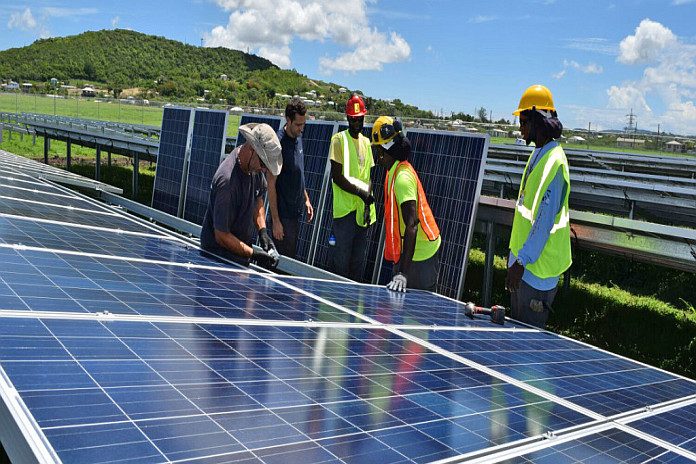By Caribbean News Global contributor
ST JOHNS, Antigua – Prime minister and minister of finance and corporate governance, Gaston Browne, 2020 Budget Statement, entitled, ‘Growth and development for the benefit of all’ – has undertaken the economics of energy transformation through strategies comprising; renewable energy, climate resilience, and a development fund to power Antigua and Barbuda.
These are expected to create employment, encourage growth and enhance contribution to Gross Domestic Product (GDP).
One megawatt of energy
Inclusive of this a $20 million renewable energy project funded primarily by a grant from the United Arab Emirates. This will supply 1-megawatt of energy, which will be sufficient to power all of Barbuda during daytime hours. Battery power will be added systematically in the future, which will make Barbuda an island total powered by solar voltaic energy.
To facilitate such access, the government will complete the $55 million new airport on Barbuda in 2020. The estimated value of all the projects, which will either be completed or advanced on Barbuda in 2020, is $155 million; not including the private sector developments.
Renewable energy
Renewable energy and financing climate resilience also accompany a successful partnership with the International Renewable Energy Agency (IRENA) and the Abu Dhabi Fund for a US$15 million renewable energy project.
The Fund has approved another US$15 million for Phase 2 of the project. This brings the total investment to US$30 million – an investment in both wind and solar energy will benefit public buildings.
Prime minister Browne explained in his 2020 Budget Statement that “ our investment in renewable energy is nearly US$70 million and evidences a commitment to reducing our carbon footprint, building resilience and adapting to climate change,” stating that “ our government established the Sustainable Island Resource Framework Fund (SIRFF) that became operational in 2019. It will programme almost US$8 million from the Green Climate Fund and other donor agencies in 2020.”
He continued: “The Board of the SIRFF is finalizing the details of this facility to allow access to funding before the 2020 hurricane season. Given the devastating effects of climate change and the implications for our way of life and very existence, it is critical that we build several facilities to help finance resilience and support our development.”
Development fund financed through – TAL
The government will also establish a Climate Resilience and Development Fund (CRDF) in 2020. The purpose of this fund is to finance projects and programmes that will build climate resilience, provide a buffer for public finances in times of natural disasters, and support the development of the country.”
The finance minister explained that: “This Fund will be financed mainly through a Tourism Accommodation Levy (TAL), which will be applicable to hotel accommodation, guest houses, apartments, Airbnb rentals, and villas.
This levy will be charged at a rate of US$3 per guest, per night, for room rates up to US$150 per night. For rooms with rates above US$150 per night, the levy will be charged at a rate of US$5 per guest per night.
The Tourism Accommodation Levy will take effect from March 1, 2020, with preliminary estimates indicating that the Tourism Accommodation Levy and the rollback of The Revenue Recovery Charge (RRC) concessions could yield between $50 million and $80 million annually or about one to two percent of GDP.





